Daily.co Alternatives
An in-depth comparison of 10 Daily.co alternatives. We analyze features, pricing, and use cases to help you select the right video API.

Many teams choose Daily.co for good reasons. It performs well for its main job: adding video calls to apps and websites. Its simple setup helps developers get started quickly, which is a big plus for many projects.
Still, no tool is perfect. Some users find limitations with certain advanced features or performance at a very large scale. We've analyzed the top alternatives, using G2 reviews to compare their pros and cons, helping you find the right fit. Let's get started.
Consider 11x for Your Sales Team
If your goal involves automating parts of your sales process, 11x provides digital workers for outreach and follow-up tasks. This tool is built for teams that want to add automated support to their sales functions. Consider how it might fit into your current strategy.
11x is a GTM platform using AI agents to manage the sales process. Its agent, Alice, finds prospects and handles outreach, while Julian qualifies inbound leads to book meetings.
This approach consolidates functions like data enrichment, outreach, and email warmup, replacing the need for separate point solutions.
Daily.co Alternatives
The following section examines several alternatives to Daily.co. We will review each option's pricing, features, and specific advantages and disadvantages to help you make an informed choice.
1) Twilio Video
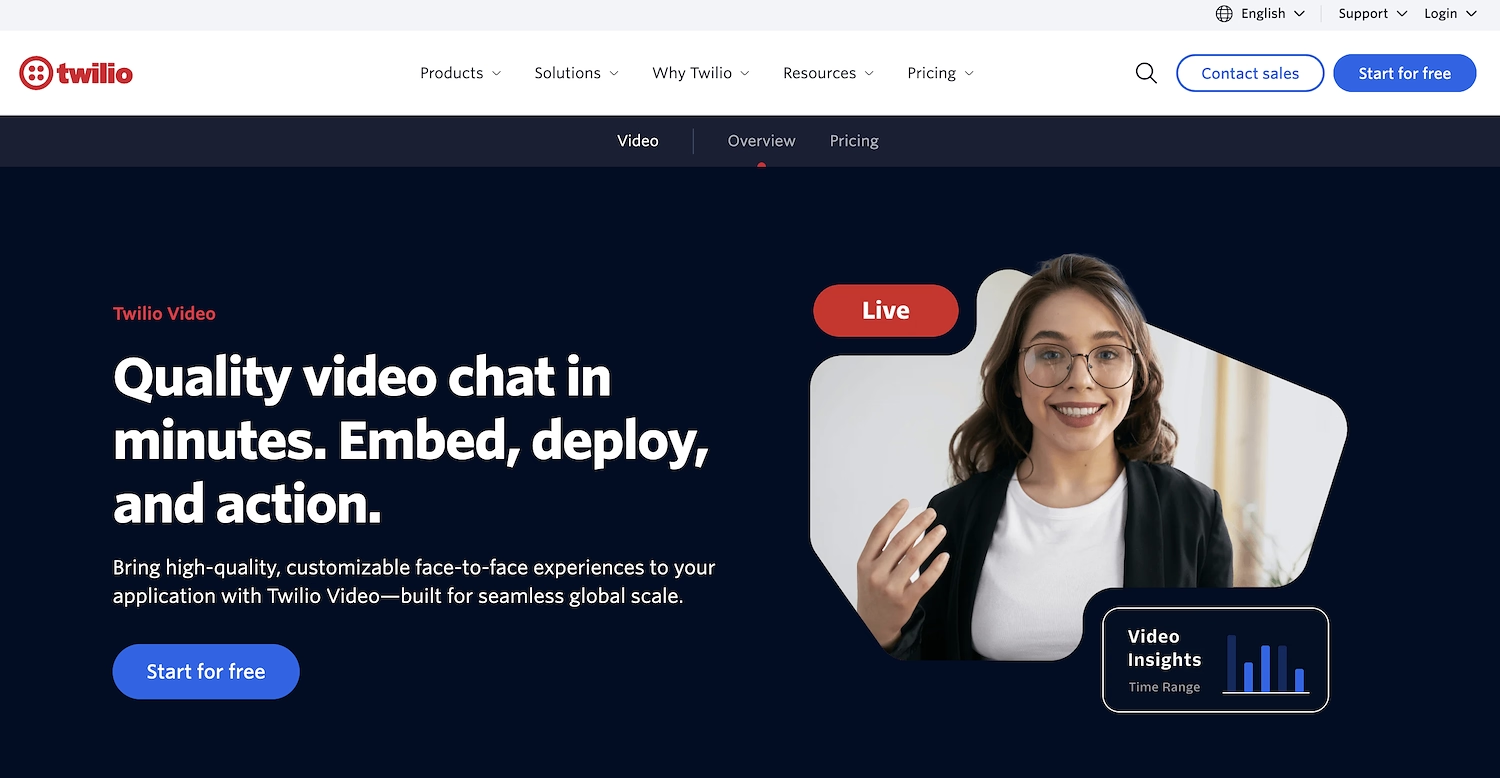
Twilio Video is a WebRTC platform for developers to add video calls, chat, and conferences into applications. It supports rapid deployment and customization for brand consistency. The platform operates at a global scale and maintains HIPAA eligibility and GDPR compliance.
Use cases include secure virtual meetings for professional services like legal or real estate. It also supports in-product video for collaboration apps with screen share and record functions.
Twilio Video's Main Features
- Offers developer-friendly integration with SDKs for JavaScript, iOS, and Android, plus CodeExchange examples.
- Adds real-time voice, PSTN calling, and text chat to expand communication channels beyond video.
- Optimizes video quality for network conditions using a Bandwidth Profile API and AI-powered noise cancellation.
- Includes free Video Insights for performance monitoring, troubleshooting, and data analysis.
How Twilio Video Compares to Daily.co
Average Review score: 0.0/5 stars based on 1 G2 review.
- Twilio Video integrates PSTN calls and text chat. This offers more communication channels in one platform compared to Daily.co's primary focus on video.
- The platform provides advanced video optimization through its Bandwidth Profile API. This feature gives developers more control over quality in low-network conditions than Daily.co's standard setup.
- It includes free Video Insights for performance analysis and troubleshooting. This is a distinct advantage for teams that need to analyze usage data without an extra cost, a feature not highlighted for Daily.co.
- While Daily.co is known for a simple setup, Twilio provides extensive developer resources. Its CodeExchange examples offer ready-to-use code for faster implementation of specific use cases.
Potential Downsides Compared to Daily.co
- Some users report difficulties with customer support. For example, one review notes that communication can be challenging, which may be a concern for teams that need responsive help.
- The platform does not list its pricing publicly. This requires you to contact sales for a quote, unlike Daily.co, which offers more transparent pricing information on its website.
- Its developer-focused nature might create a steeper learning curve. Teams without strong technical resources may find Daily.co's simpler interface easier to adopt and manage.
Pricing and Cost Considerations
Twilio Video does not list its pricing publicly; you must contact sales for a quote. In contrast, Daily.co offers transparent pricing on its website, which simplifies upfront cost estimation.
2) Agora
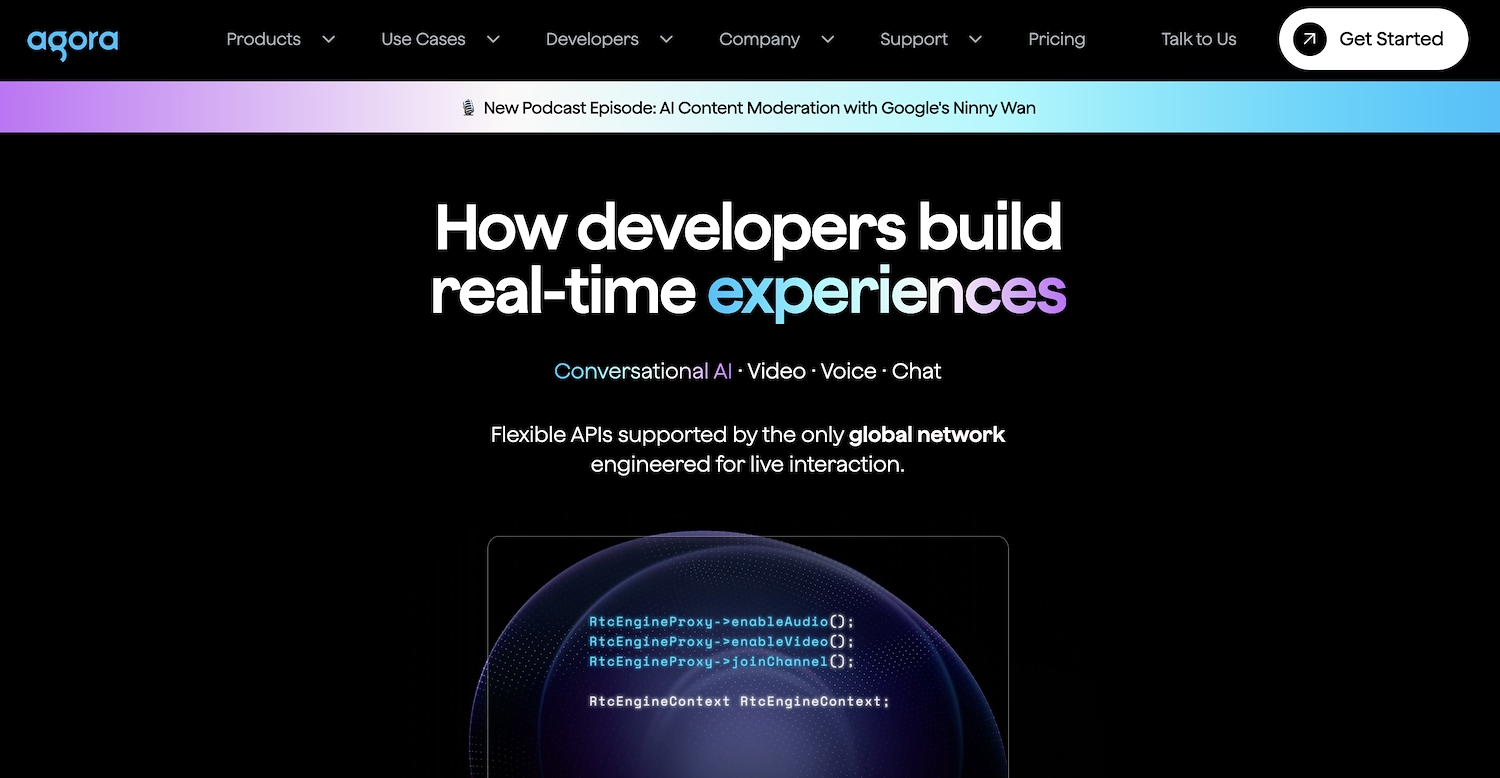
Agora provides a platform for developers to embed real-time communication into applications. It supplies APIs and SDKs for voice, video, and interactive live streams. This allows companies to build their own communication tools from the ground up.
The platform supports various use cases, including virtual meetings and conference calls for remote work. Teams can integrate features like an interactive whiteboard to facilitate collaboration during these sessions.
Agora's Main Features
- Provides APIs and SDKs for integrating voice, video, and interactive live streams into applications.
- Includes an interactive whiteboard to support real-time collaboration during virtual meetings.
- Enables interactive live streaming for large-scale broadcast events.
How Agora Compares to Daily.co
Average Review score: 4.8/5 stars based on 232 G2 reviews.
- Agora enables interactive live streams for large-scale broadcasts, which differs from Daily.co's focus on embedding smaller-group video calls.
- It includes an interactive whiteboard for real-time collaboration, offering a built-in visual tool not highlighted as a core feature for Daily.co.
- The platform supplies APIs for voice and live streams in addition to video, providing a broader range of communication options compared to Daily.co's primary video service.
- This tool is built to support large broadcast events with many viewers, making it a fit for webinars or live shows, a different use case than Daily.co's typical meeting structure.
Potential Downsides Compared to Daily.co
- Agora focuses on real estate investment management and does not provide native video call APIs. This is different from Daily.co, which specializes in embedding real-time video communication into apps.
- The platform does not offer developer SDKs for iOS and Android to build custom communication tools. Daily.co provides these resources for faster integration across different platforms.
- Some users report a learning curve, and implementation can take time. In comparison, Daily.co is often noted for its simpler setup, which helps teams get started more quickly.
Pricing and Cost Considerations
Agora does not list its pricing publicly, requiring you to contact sales. This contrasts with Daily.co's transparent pricing. For accurate cost information, visit Agora's official website.
3) Vonage API Platform
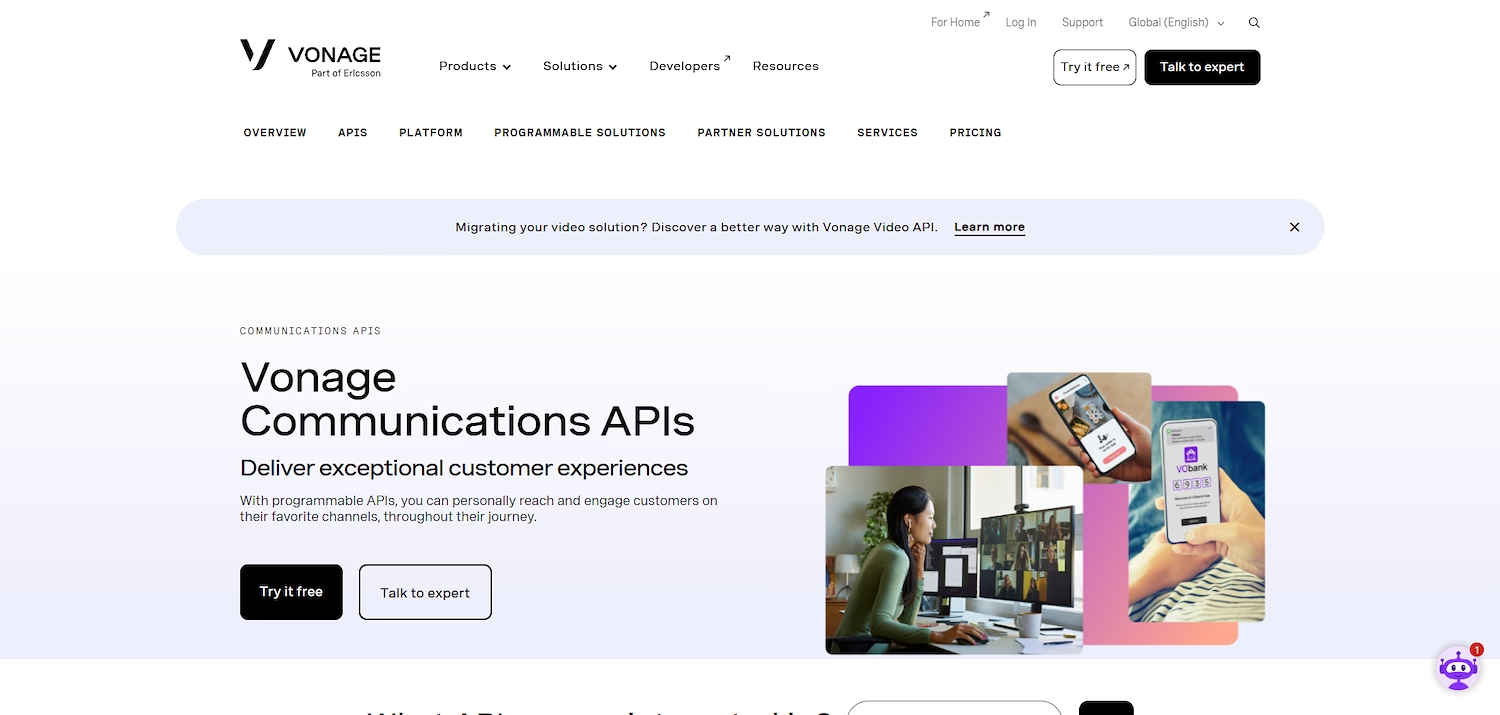
The Vonage API Platform lets organizations embed live video into web, mobile, and desktop applications. This WebRTC-based platform offers full-code SDKs and low-code options. Teams can create custom solutions or add video experiences with speed.
It suits secure meetings for finance or legal sectors and internal collaboration for remote workforces. The platform supports industry compliance for privacy-sensitive sectors.
Vonage API Platform's Main Features
- Offers AI-powered capabilities like an Audio Connector for transcription and a Media Processor for live effects such as background blur and echo cancellation.
- Supports interactive broadcasts for up to 16,000 participants and streams content to social platforms using HLS, LL-HLS, and RTMP.
- Includes an Experience Composer to record or live-stream the entire application view, not just the individual video tiles.
- Provides advanced insights with usage analytics and allows data export to existing business intelligence systems for deeper analysis.
How Vonage API Platform Compares to Daily.co
Average Review score: 4.2/5 stars based on 387 G2 reviews.
- Vonage API Platform provides AI-powered tools like an Audio Connector for transcription and a Media Processor for background blur. This offers more advanced in-call effects compared to Daily.co's standard video features.
- It supports large interactive broadcasts for up to 16,000 participants. This scale is significantly larger than Daily.co's typical use case for smaller team meetings.
- The platform includes an Experience Composer to record the entire application view. This gives a more complete recording of a session than just capturing individual video feeds.
- This tool offers advanced analytics and allows data export to business intelligence systems. This provides deeper usage insights than the standard analytics available with Daily.co.
Potential Downsides Compared to Daily.co
- Some developers find the platform has a learning curve. The available documentation can feel limited, which might slow the initial setup compared to Daily.co's simpler process.
- The platform does not list its pricing publicly; you must contact sales for a quote. This differs from Daily.co, which shows its pricing plans on its website for easier cost estimation.
- Some users report connection issues in multi-party calls. For example, a call might drop when a third person joins, a potential issue for teams that depend on reliable group meetings.
Pricing and Cost Considerations
Vonage requires you to contact sales for a quote, which contrasts with Daily.co's transparent pricing. For the most accurate information, visit the Vonage API Platform's official website, as user data suggests it is a high-cost solution.
4) Zoom
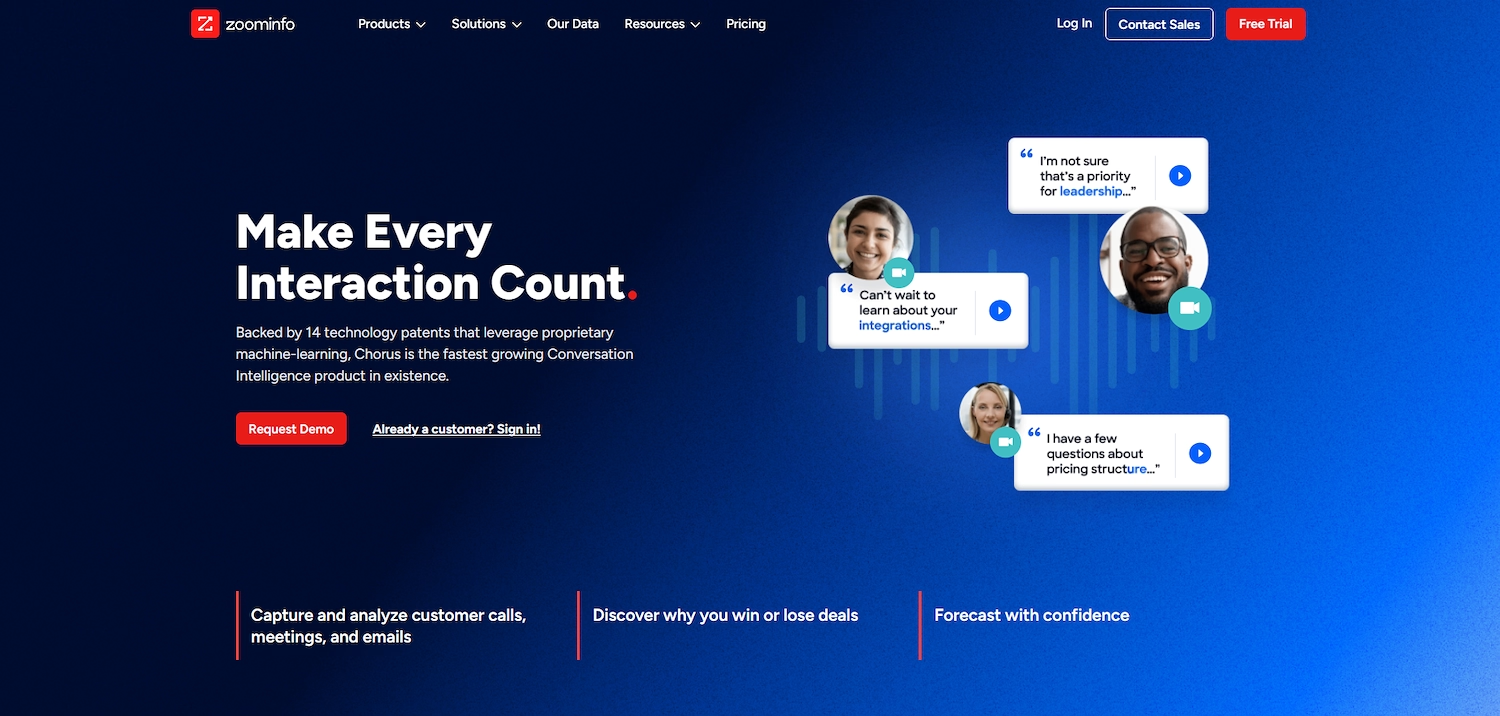
Zoom is a communications platform for video, phone, and chat. People use it for virtual meetings, conference calls, and webinars. It serves as a tool for business collaboration and public-facing events.
The platform also supports education through online classes and training. It is a frequent choice for remote work and distance learning environments.
Zoom's Main Features
- Integrates video, phone, and chat into a single communications platform.
- Supports virtual meetings, conference calls, and webinars.
- Serves as a tool for business collaboration and public-facing events.
- Provides features for online classes and training in education.
How Zoom Compares to Daily.co
Average Review score: 4.5/5 stars based on 54,099 G2 reviews.
- Zoom includes an AI Companion at no extra cost for features like meeting summaries. This provides automated assistance that is not a standard part of Daily.co's core API offering.
- It combines video, phone, chat, and a calendar into a single platform. This unified approach differs from Daily.co, which focuses on providing a developer tool to embed video into existing apps.
- The platform offers workspace management tools, such as desk booking and visitor management. These features are designed for hybrid office logistics, a function outside the scope of Daily.co's video communication service.
- This tool provides native breakout rooms for splitting large meetings into smaller groups. This is a built-in meeting management feature, whereas with Daily.co, similar functionality would require custom development.
Potential Downsides Compared to Daily.co
- Zoom offers limited UI customization. This differs from Daily.co, which gives developers full control to build a video interface that matches their application's branding.
- The platform is a complete communications product, not just a developer API. For teams that only need to embed video calls, this may add complexity compared to Daily.co's focused toolset.
- Some users report that the wide range of features can feel overwhelming. Daily.co provides a more direct approach, as developers integrate only the specific functions their application requires.
Pricing and Cost Considerations
Zoom offers a free plan and paid tiers starting at $15.99 per host per month. This per-user subscription model differs from Daily.co's API-first, usage-based pricing. Zoom's structure provides predictable costs, while Daily.co may be more economical for applications with variable user activity.
5) Whereby

Whereby provides a video platform for browser-based meetings. Companies can embed video calls into websites or apps, with no downloads or guest logins needed for users to join.
Common use cases include telehealth, financial advisory, and online education. The tool also supports internal team collaboration through simple, persistent video rooms.
Whereby's Main Features
- Offers instant video calls and permanent room links for persistent meeting spaces.
- Provides a virtual whiteboard and live transcriptions to support in-call collaboration.
- Allows programmatic room creation for building dynamic workflows.
- Maintains ISO 27001 certification, in addition to GDPR and HIPAA compliance.
How Whereby Compares to Daily.co
Average Review score: 4.6/5 stars based on 1,129 G2 reviews.
- Whereby lets guests join meetings in a browser without downloads or logins, which can be simpler for users than some custom Daily.co setups.
- It includes built-in breakout rooms to split large meetings. This is a native feature, whereas Daily.co requires custom code for similar functionality.
- The platform has a virtual whiteboard for collaboration. This tool is integrated, while Daily.co would need a third-party solution for the same feature.
- This tool uses permanent room links for easy access to recurring meetings, which differs from the typical API-based room creation in Daily.co.
- Whereby holds ISO 27001 certification, offering a specific security standard not highlighted by Daily.co.
Potential Downsides Compared to Daily.co
- Whereby provides a pre-built user interface for embedding, which may offer less design freedom than Daily.co. Developers who need to create a completely custom video experience might find Daily.co's API more flexible.
- Some users report occasional connectivity issues or drops in video quality. This can be a factor for teams that require very high call stability, an area where Daily.co's infrastructure is often noted.
- The platform offers both a developer API and a standalone meeting product. This is different from Daily.co's singular focus on its API, which may better suit teams wanting a purely developer-centric tool.
Pricing and Cost Considerations
Whereby offers a free developer plan and a fixed-cost "Build" plan at $9.99 per month, which provides cost predictability. This contrasts with Daily.co's usage-based pricing, where expenses align with actual use, potentially making it more economical for applications with fluctuating activity.
Consider 11x for Your Sales Team
If your goal is to automate parts of your sales process, 11x provides digital workers for outreach and follow-up. This tool is built for teams that want to add automated support to their sales functions. It is a specific solution to consider for your strategy.
11x uses AI agents to find prospects and qualify inbound leads to book meetings. This approach consolidates activities like data enrichment and email outreach, which can reduce the need for multiple separate tools in your sales stack.
With 11x, we run your sales playbook. Our agent Alice finds accounts, enriches data, and starts outreach. Julian qualifies prospects and books meetings. This consolidates your GTM stack, replacing tools for intent signals and email warmup, so you don't need extra software or hires.
Book a demo to see it work.
6) 100ms
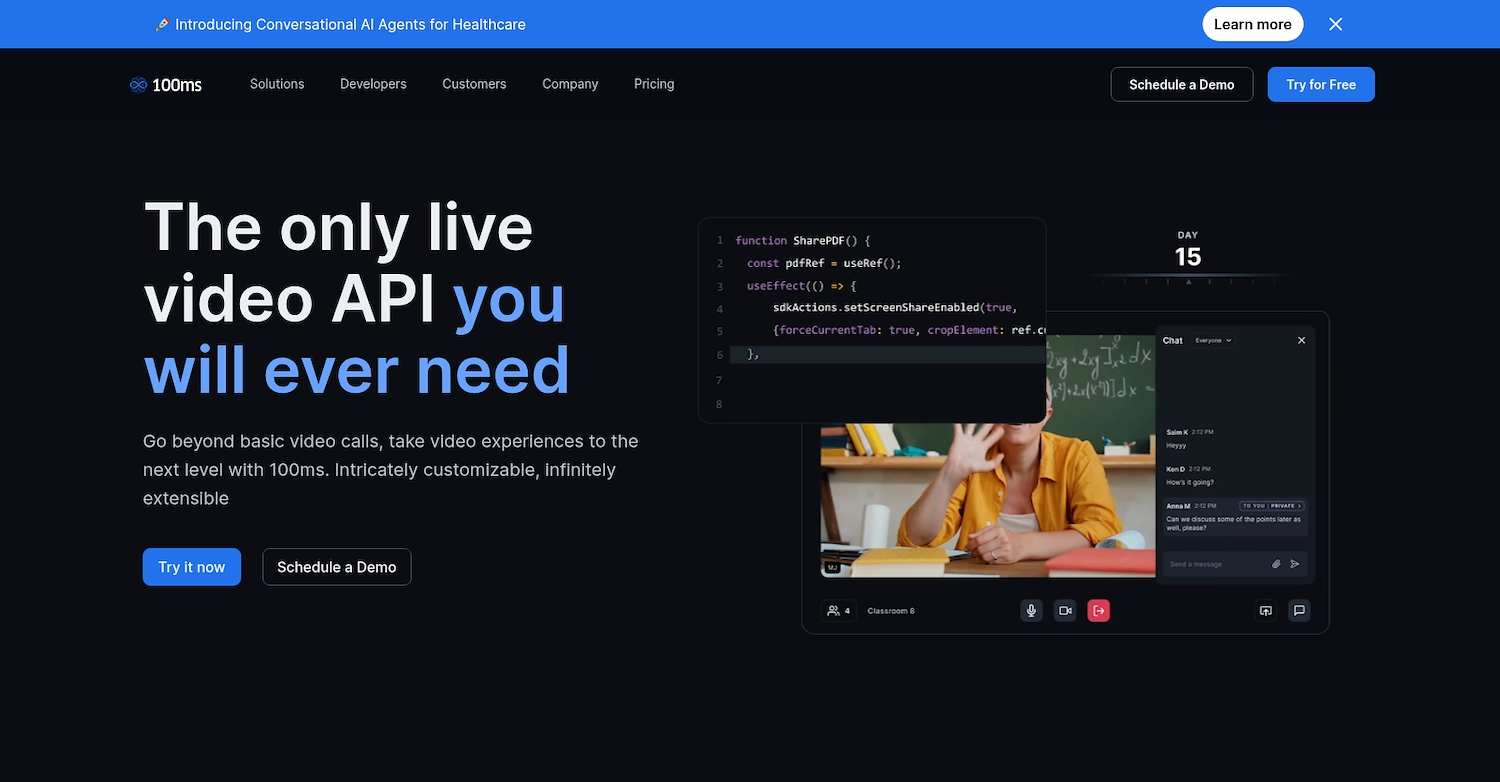
100ms is a developer platform with SDKs to add live video and audio to apps. It supports web, iOS, and Android. Companies use it for conference calls and virtual events. The platform provides templates to build custom features for one-on-one or group sessions.
100ms's Main Features
- Offers prebuilt UI components to accelerate development for custom video experiences.
- Provides APIs for specific use cases, including large-scale virtual events, audio rooms, and video KYC.
- Supplies both client-side and server-side SDKs for integrating audio, video, and interactivity features.
- Includes high-performance live-streaming capabilities for broadcasts and large events.
How 100ms Compares to Daily.co
Average Review score: 4.8/5 stars based on 5 G2 reviews.
- 100ms provides prebuilt UI components that can accelerate development. This is different from Daily.co, where creating a fully custom interface may require more development effort.
- It supports multiple levels of interactivity for large events, such as on-stage and off-stage roles. This allows for more complex webinar structures compared to Daily.co's standard group call format.
- This tool offers specific security compliance like SOC2 Type II. This provides an additional layer of verified security beyond the standard compliance noted for Daily.co.
- The platform is designed for high-performance live streaming to large audiences. This focus on broadcasts is a key difference from Daily.co, which centers on embedded video meetings.
Potential Downsides Compared to Daily.co
- Some developers report that the implementation documentation for 100ms can be difficult to follow. This contrasts with Daily.co, which is often recognized for a simpler setup process that allows for faster integration.
- The platform may present a steeper learning curve. Some users note that customer support could be more responsive, and specific technical issues like foreground service handling on Android have been reported.
- Its pricing begins with a fixed monthly cost. This structure can be less economical for applications with variable user activity when compared to Daily.co's usage-based model, where costs scale directly with use.
Pricing and Cost Considerations
100ms offers plans starting at $99.00 per month for both live streaming and video conferencing. This fixed monthly cost differs from Daily.co's usage-based model. The 100ms structure provides predictable expenses, while Daily.co may be more cost-effective for applications with fluctuating user activity.
7) Sendbird
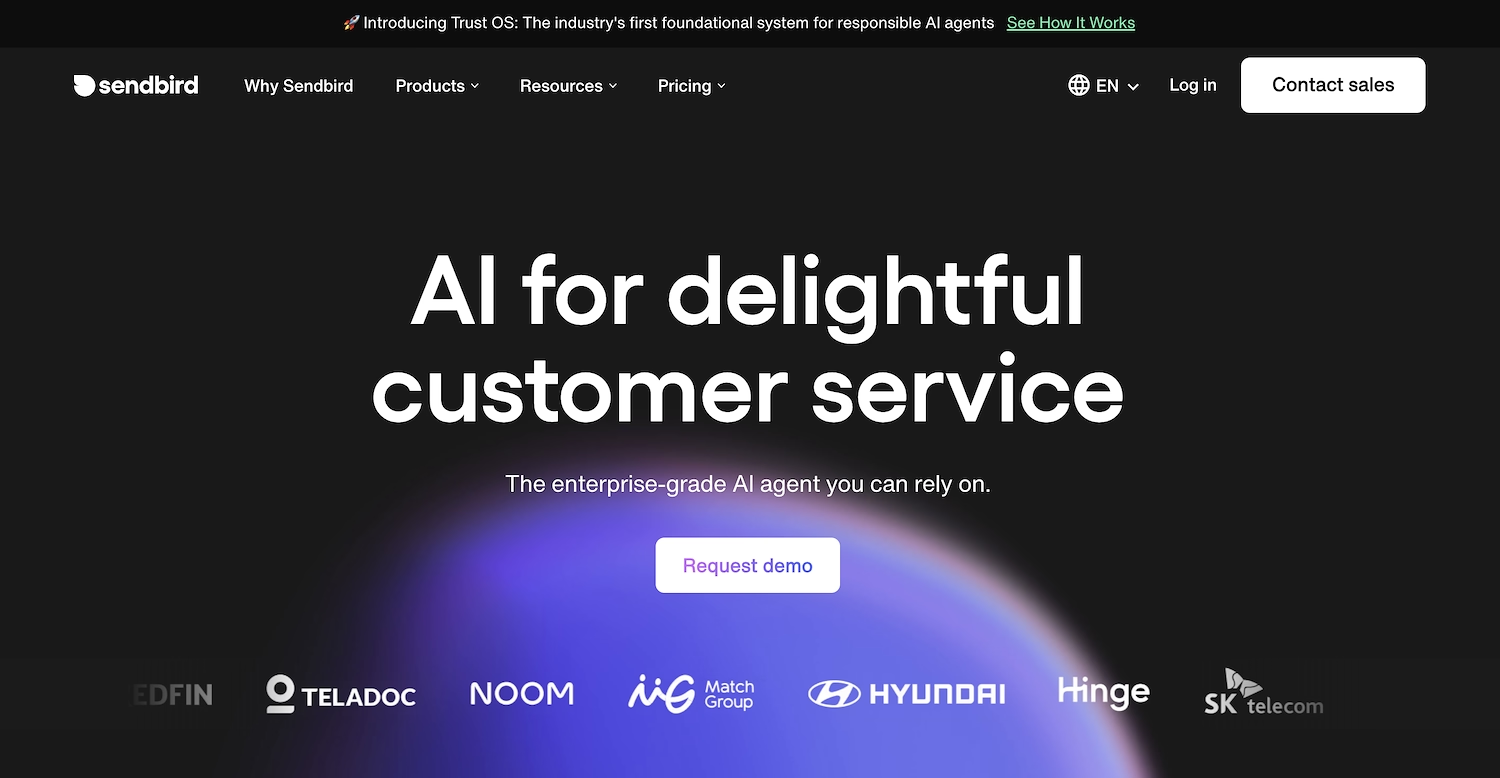
Sendbird provides a communication platform with APIs and SDKs for developers. Teams use these tools to add chat, voice, and video features into mobile and web applications. This allows for in-app conversations directly within a company's product.
For meetings, the video API supports real-time interaction. Users can connect for conference calls without a separate application. The platform enables integrated communication experiences inside a brand's own environment.
Sendbird's Main Features
- Provides an omnichannel AI agent platform for customer service on mobile, web, social, SMS, and email.
- Includes AI agents that proactively initiate conversations based on anticipated customer needs.
- Offers a single control center, the AI Agent Builder, to build, test, deploy, and monitor virtual agents.
- Enables conversation continuity, allowing agents to resume interactions where customers left off on any channel.
How Sendbird Compares to Daily.co
Average Review score: 4.6/5 stars based on 93 G2 reviews.
- Sendbird offers an omnichannel platform with AI agents for support on mobile, web, and social media. This is different from Daily.co, which focuses on embedding video calls into applications.
- Its AI agents proactively start conversations based on customer needs. This contrasts with Daily.co, where video sessions are typically initiated by users for a specific meeting.
- The platform provides a single AI Agent Builder to create and manage virtual agents. Daily.co requires developers to build and handle their video logic without a similar centralized tool.
- This tool supports conversation continuity, so agents can resume chats across different channels. Daily.co's video calls are self-contained sessions and do not offer this cross-channel persistence.
Potential Downsides Compared to Daily.co
- Sendbird is an omnichannel platform, which might be more complex than necessary for teams that only need to embed video calls. Daily.co provides a more focused solution specifically for video integration.
- Some users note a learning curve due to the platform's wide range of features. In comparison, Daily.co is often recognized for a simpler setup that allows for faster implementation.
- Its pricing model begins with a monthly subscription. This can be less cost-effective for applications with variable usage compared to Daily.co's pay-as-you-go structure.
Cost Comparison and Budget Impact
Sendbird's pricing begins at $349 per month for 5,000 monthly active users, offering a predictable fixed cost. This contrasts with Daily.co's usage-based model, which can be more economical for applications with fluctuating activity as costs align directly with use.
8) CometChat
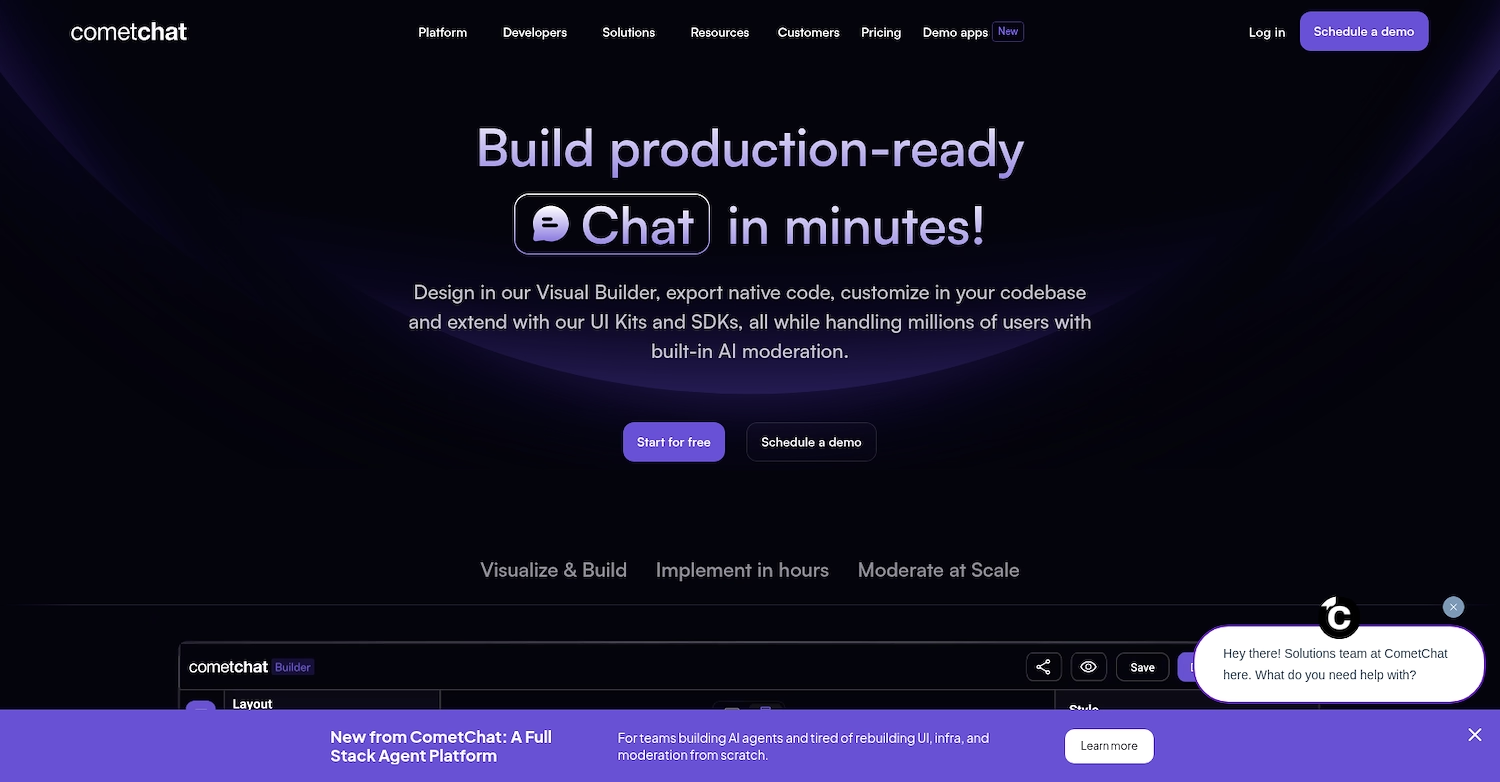
CometChat provides a platform with APIs and SDKs for developers. These tools add chat, voice, and video calls to websites and mobile applications. This lets companies build communication features directly into their products.
The platform supports one-on-one meetings and group conference calls. It includes functions such as screen share to facilitate business collaboration during these sessions.
CometChat's Main Features
- Provides APIs and SDKs to add user-to-user text messaging to mobile and web applications.
- Offers UI Kits and an extension library to accelerate launch and integration with other services.
- Supports various communication types to connect users, such as marketplace sellers with buyers or students with teachers.
- Includes professional and community support options along with developer documentation.
How CometChat Compares To Daily.co
Average Review score: 4.6/5 stars based on 110 G2 reviews.
- CometChat provides UI Kits to help developers launch faster. This is different from Daily.co, where building the user interface often requires more custom work.
- It offers a robust extension library to integrate with other services. This feature simplifies connecting chat to other tools, which may require more manual effort with Daily.co.
- The platform specializes in user-to-user text messaging for specific contexts like marketplaces or telehealth. This focus is more targeted than Daily.co's broader video communication service.
- This tool supports various communication types to connect different user roles, such as sellers with buyers. Daily.co is primarily structured for general video meetings rather than these specific interaction models.
Potential Downsides Compared to Daily.co
- CometChat's UI Kits may offer less design flexibility. In comparison, Daily.co's API-first approach provides developers the tools to construct a video experience from scratch for full brand consistency.
- Some developers report that the platform's documentation is not always clear. This can make the initial setup more complex than with Daily.co, which is often recognized for a straightforward integration process.
- The tool's primary focus is on text chat, with video as an additional feature. For teams that only need a specialized video API, Daily.co's video-centric platform might be a more direct solution.
- Its pricing model can seem expensive for some applications. User reviews note the high cost, which may be less economical for projects with variable activity compared to Daily.co's pay-as-you-go structure.
Pricing Structures and Cost Analysis
CometChat does not list its pricing publicly, but user reviews note its high cost. This model contrasts with Daily.co's pay-as-you-go structure, which can be more economical for applications with variable usage. For specific pricing, visit the CometChat website.
9) Mux
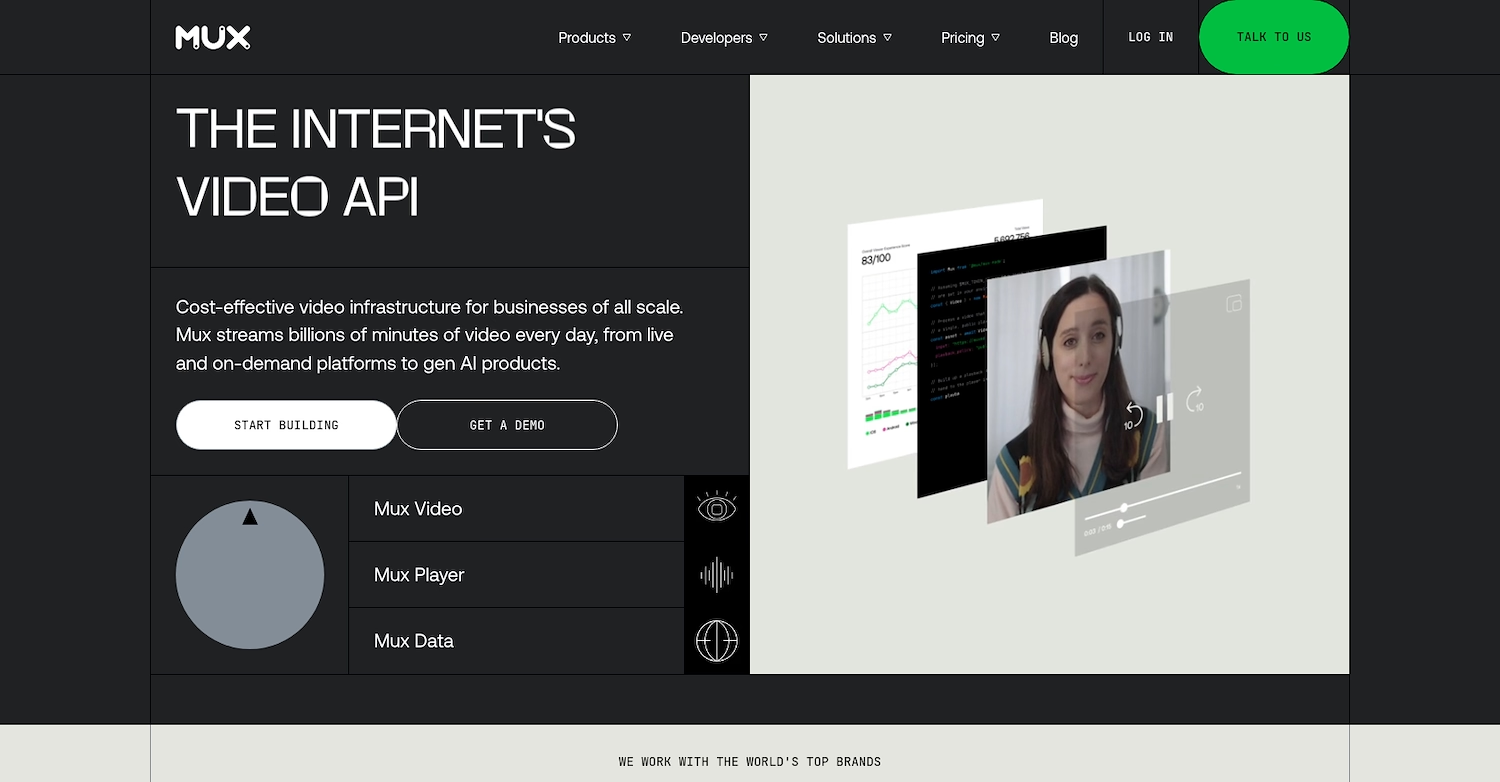
Mux provides a video platform for developers. It offers tools to add video features, such as meetings and conference calls, into websites and applications. This allows companies to build and control custom video experiences directly within their own products. The platform is designed for live and on-demand video use cases.
Mux's Main Features
- Provides video infrastructure for building live, on-demand, and interactive video scenarios.
- Includes stream analytics to gather real-user insights from the audience in real time.
- Offers a custom video player to create tailored viewing experiences.
How Mux Compares to Daily.co
Average Review score: 4.4/5 stars based on 19 G2 reviews.
- Mux provides stream analytics for real-time user insights. This offers more detailed audience engagement data compared to the standard performance metrics available with Daily.co.
- It supports both live and on-demand video. This gives developers more flexibility than Daily.co, which focuses mainly on real-time video communication.
- The platform includes a custom video player to create tailored viewing experiences. This is a different approach from Daily.co, where developers build the entire video interface using the API.
- This tool is built as a complete video infrastructure platform. It handles live, on-demand, and analytics, which is a broader scope than Daily.co's primary focus on embedding live video calls.
Potential Downsides Compared to Daily.co
- Some users report that Mux can fail at critical times. This differs from Daily.co, which is often recognized for its call stability.
- The platform's broad scope covers on-demand video and analytics. This might add complexity for teams that only need real-time video calls, unlike Daily.co's more focused API.
- Its wide feature set for live and on-demand video can create a steeper learning curve. In comparison, Daily.co's specific focus on real-time video often allows for a simpler setup process.
Pricing and Cost Considerations
Mux provides a starter plan for $10.00 per month in addition to a pay-as-you-go model. This gives it a predictable, low-cost entry point for small projects, whereas Daily.co operates on a purely usage-based structure where costs scale directly with activity.
10) Pexip
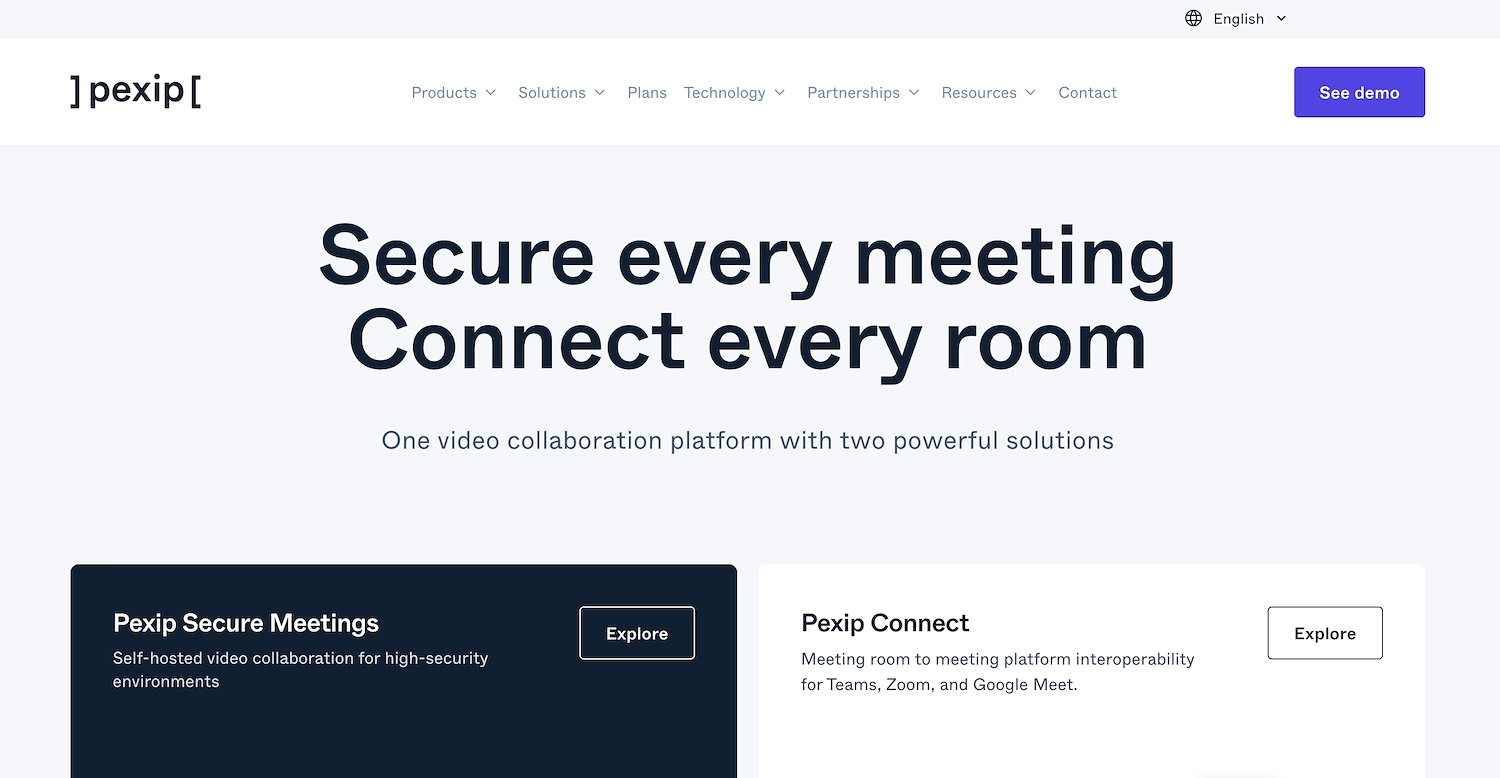
Pexip is a video platform for large organizations that require secure meetings and interoperability. It connects different video systems, such as Microsoft Teams or Google Meet, with standard room hardware. This setup supports use cases like business communications, telehealth, and judicial services, and lets users join from any device.
Pexip's Main Features
- Provides tools for meeting coordination and scheduling.
- Manages participant permissions to control meeting access.
- Supports screen sharing and presentations during calls.
- Includes live chat and recording functions for collaboration and record-keeping.
How Pexip Compares to Daily.co
Average Review score: 4.4/5 stars based on 65 G2 reviews.
- Pexip connects different meeting platforms like Microsoft Teams and Zoom with existing room hardware, which differs from Daily.co's focus on embedding video into a single application.
- It offers a self-hosted option for organizations that need full control over their data, a deployment model suited for regulated industries and not standard with Daily.co's cloud API.
- The platform is designed for large organizations to connect various video systems, a focus on enterprise interoperability that contrasts with Daily.co's developer tools for custom in-app video.
- This tool allows users to join meetings from any device and connect systems like Cisco or Poly hardware to cloud meetings, an integration level different from Daily.co's software-based SDKs.
Potential Downsides Compared To Daily.co
- Pexip is designed for large organizations, which can make its setup complex. In contrast, Daily.co offers a more direct API for developers who need to add video calls to an application without extensive system integration.
- The platform's focus is to connect different video systems, not to build custom interfaces. This provides less design freedom for developers compared to Daily.co's API, which allows for a fully branded video experience.
- Its pricing model is a per-device annual subscription. This structure may be less cost-effective for applications with variable usage than Daily.co's pay-as-you-go model, where costs align with activity.
Pricing Models and Budget Impact
Pexip offers annual, per-device subscriptions starting at $120, providing predictable costs for hardware integration. This contrasts with Daily.co's pay-as-you-go model, which can be more economical for applications with variable usage since costs align directly with activity.
Which One Should You Go With?
Choosing a Daily.co alternative involves many variables, from pricing to specific features. This guide has presented several options to help you evaluate which platform best fits your needs and business goals.
If your focus is on sales automation, 11x offers a different approach. It provides AI agents to handle outreach and lead qualification, consolidating parts of your sales process and potentially reducing the need for multiple specialized tools.




